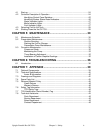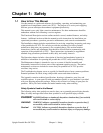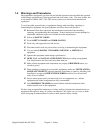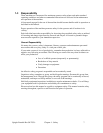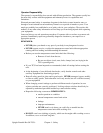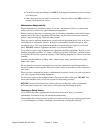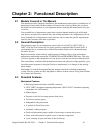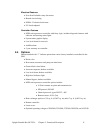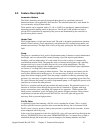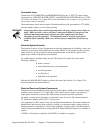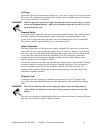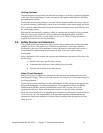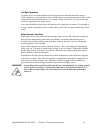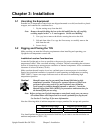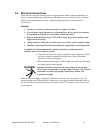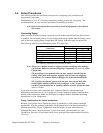Upright Portable Hot Oil TCUs Chapter 2: Functional Description 12
2-5 Feature Descriptions
Immersion Heaters
The fluid is heated by the specially designed three-phase low watt density electrical
immersion heater, and regulated by the controller. The standard heater has a steel sheath for
low watt density and good heat transfer.
These models can be supplied with 6, 12, 18, or 24 kW low watt density immersion heaters,
depending upon the heating needs of the process. The 18 and 24 kW models are built to
provide full or partial heat as required by the process and determined by the controller, to
provide more precise control.
Heater Tank
The Upright features a single pass heater tank. The tank is designed to maintain an optimum
balance of fluid velocity versus watt density, and turbulence for excellent heat transfer, and
minimal pressure drop. The high fluid velocity will greatly prolong the life of the heater and
fluid.
Pump
The pump is a mechanical seal, positive displacement pump. It features a nearly maintenance
free design, and was selected after extensive testing to provide superior performance,
flexibility, and low maintenance. It is well suited for use with a variety of commercially
available heat transfer fluids. The pump has only two internal moving parts, and a specially
designed seal to give years of trouble free service, even at high temperatures. The only
routine maintenance required is the monthly greasing and occasional head space adjustment;
see Section 5-3 on Page 40 for more information.
The pump is capable of running in either direction. Thus, the pump reverse feature can be
used to draw fluids back from the process. It is not necessary to install a service air line to
purge lines before changing molds. Since the pump is capable of achieving extremely high
pressures, it is necessary to regulate the pressure through use of a regulating bypass line (Ful-
Flo valve). Because the pump is a positive displacement pump, it will supply the process with
rated flow at or below the rated pressure.
The flow is constant until the pressure reaches the rated pressure. The pressure however is a
function of frictional losses through the process that it is attached to. Systems with large
process connections, ports, and piping will operate at low pressures. While systems with
small process connections, ports, and piping will operate at higher pressures. Once pressure
requirements exceed the rated pressure, the Ful-Flow valve will open and bypass the
necessary fluid to prevent high pressures.
Ful-Flo Valve
A regulating bypass line featuring a Ful-Flo valve is standard in all units. This is a safety
device to prevent excessive pressure in the event that the delivery line is obstructed. Each
Ful-Flo valve is factory preset to limit system pressure as specified by the customer. It must
not be tampered with in any way.
In the event of an obstruction in the line, the Ful-Flo valve will open and divert fluid from the
delivery TO PROCESS line to the return FROM PROCESS line. A constant flow of fluid is
maintained through the heater tank to prevent damage to the heating elements and fluid.



